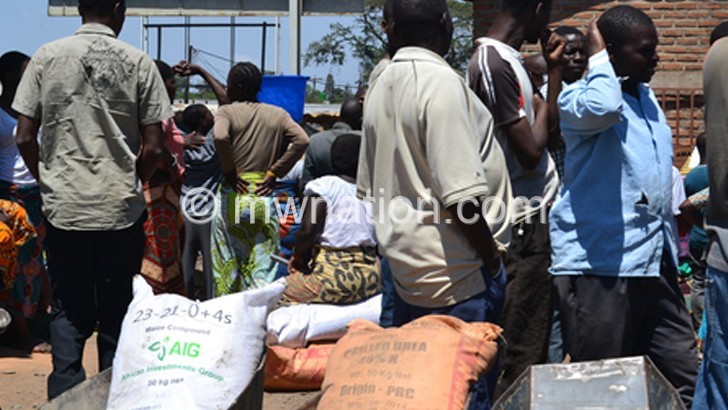Has Fisp failed Malawians?
At the age of 45, Dorothy Nanthulu, a subsistence farmer from Makokola Village, Traditional Authority (T/A) Nankumba in Mangochi, has witnessed Malawi having plenty of maize and also hunger.
Like other villagers, she knows she has the right to food. And being a Malawian, that food is nsima, the country’s staple food. It is this mindset that worries her.

“Maize gives us nsima, and that is good. However, the crop does not do well in all of the country’s districts. What is more, it is expensive to grow as it requires fertiliser and a lot of other things that cost money,” says Nanthulu.
To her, there is need to diversify the country’s food sources.
“We cannot continue relying on maize only. Whether maize does well or not, we still need food.
“Therefore, my appeal is increased efforts by stakeholders to engage us into various ways of farming so that we should be food secure with or without maize,” observes Nanthulu.
She says, currently, farmers in her village are engaged in conservation agriculture, which does not depend on fertiliser.
Chrissy Davison, a farmer from Mvumba Village in the same area, says most people in the country face hunger because they lack farming inputs, noting this forces people to be perennial beggars.
To achieve food security, government introduced Farm Input Subsidy Programme (Fisp) in 2005 to allow poor and vulnerable subsistence farmers to access subsidised fertiliser and seed.
But a 2005 study by the Michigan State University argued that Fisp was not a solution to Malawi’s food insecurity, as its success depends on favourable weather conditions.
Cosmass Fire, 41, one of the lead farmers from Mawilika Village, T/A Nkula in Machinga agrees that Fisp has proved not to be the solution to Malawi’s food challenges.
“Each year, there are irregularities-whether it is corruption, late supply or the commodities benefitting the wrong people. It is only those related to the chiefs that benefit from Fisp. When we experience erratic or heavy rainfall, it leads to poor harvest. How can we keep banking on such a programme?” wonders Fire.
Currently, there are fears of hunger due to poor rains in some parts of the country. This clearly shows Fisp alone cannot save Malawi from food shortages.
But what does this mean to the quest for the right to food?
According to a draft food security bill of 2011, food security is a situation when all people at all times have access to sufficient, safe, nutritious food to maintain a healthy and active life.
In light of this, the Catholic Development Commission in Malawi (Cadecom), a relief and developmental arm of the Episcopal Conference of Malawi (ECM), started implementing a three-year project called Increasing Food Security and resilience to climate shocks for 1 250 households in Malawi.
The project runs from 2014 October to 2017 September.
Cadecom national programmes coordinator Yusuf Mkungula says the organisation embarked on this project because they want to help Malawians access food.
Mkungula believes food security in Malawi needs a clear plan and direction that is backed by legal framework.
Nelson Kaputa, agriculture extension development coordinator in Nankumba Extension Planning Area (EPA), agrees that the right to food applies to all Malawians regardless of age, tribe or physical ability.
Kaputa, however, condemns the politicisation of food distribution by some traditional leaders and politicians, saying the right to food for all Malawians can only be fulfilled if policy makers adopt an integrated approach in community development.
Added Kaputa: “The right to food is one of the very most important human rights. We need government to institute a legal framework so that people have food,” said Mkungula.
Through the project, Cadecom is lobbying and advocating activities to ensure that climate change and right to food-related policies are formulated and enacted. Such policies include the Disaster Risk Reduction (DRR) Policy (approved in February this year), National Climate Change Policy, Right to Food Bill and National Agriculture Policy.
According to United Nations’ Food and Agriculture Organisation (FAO), even when Malawi has plenty of maize, it continues to import large quantities of maize as hunger always finds its way in the country.
The draft food security bill outlines how the country can resolve its food insecurity woes, and clearly explains the role of State and non-State actors in the process.
But Mkungula observes that if the bill is not passed, there will continue to be chaos in food availability and distribution in the country.
In his article published in January 2013 in Africa Renewal, an online publication of the United Nations, author Masimba Tafirenyika argues that food security equals national security.
The article, titled What went wrong? Lessons from Malawi, Tafirenyika argues national security loses its legitimacy if thousands of citizens die not from enemy firepower but from starvation, or risk their lives crossing borders while fleeing from hunger.
“Africa needs a strong food policy backed by resources to implement its food security programmes,” reads the article part.





